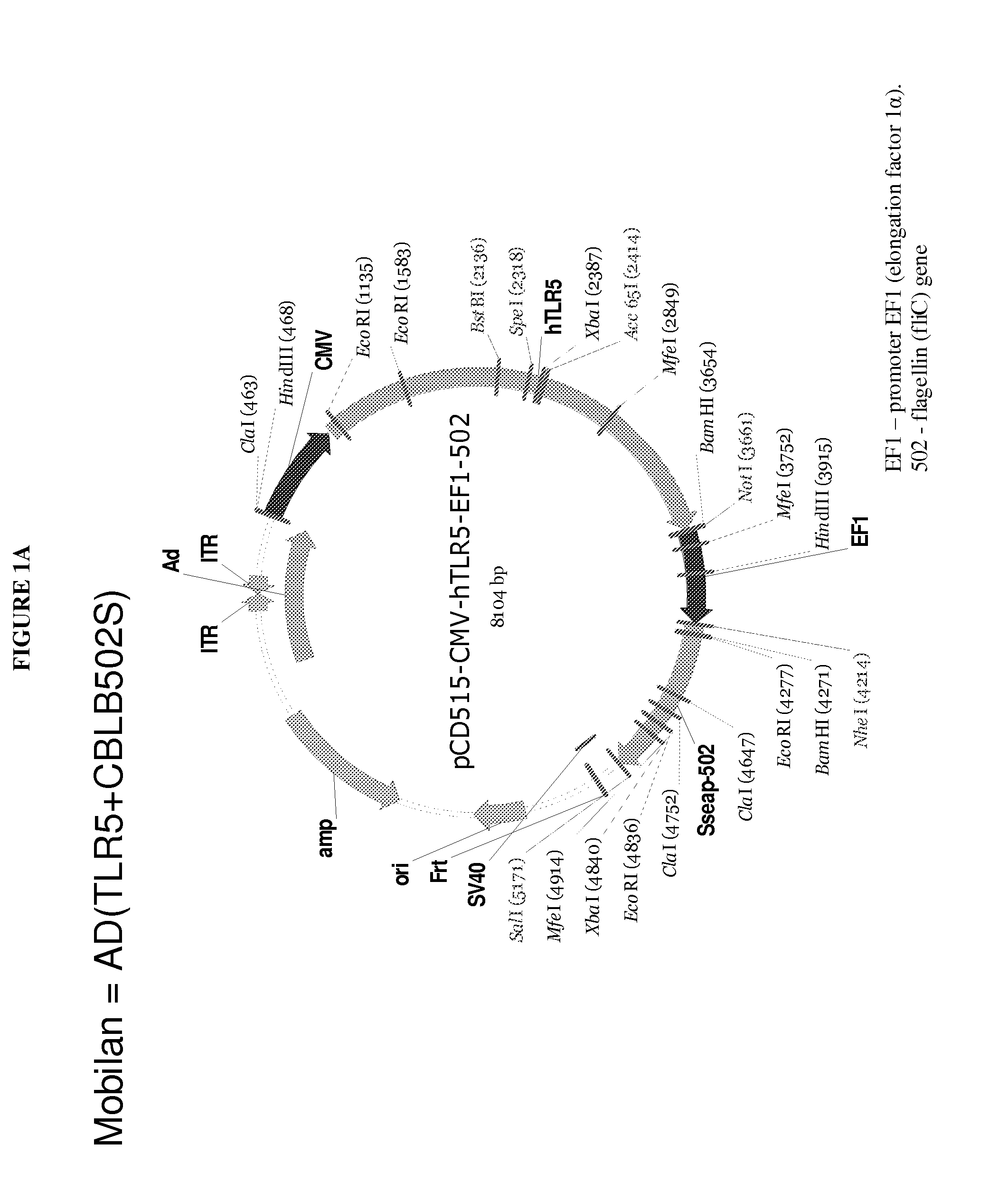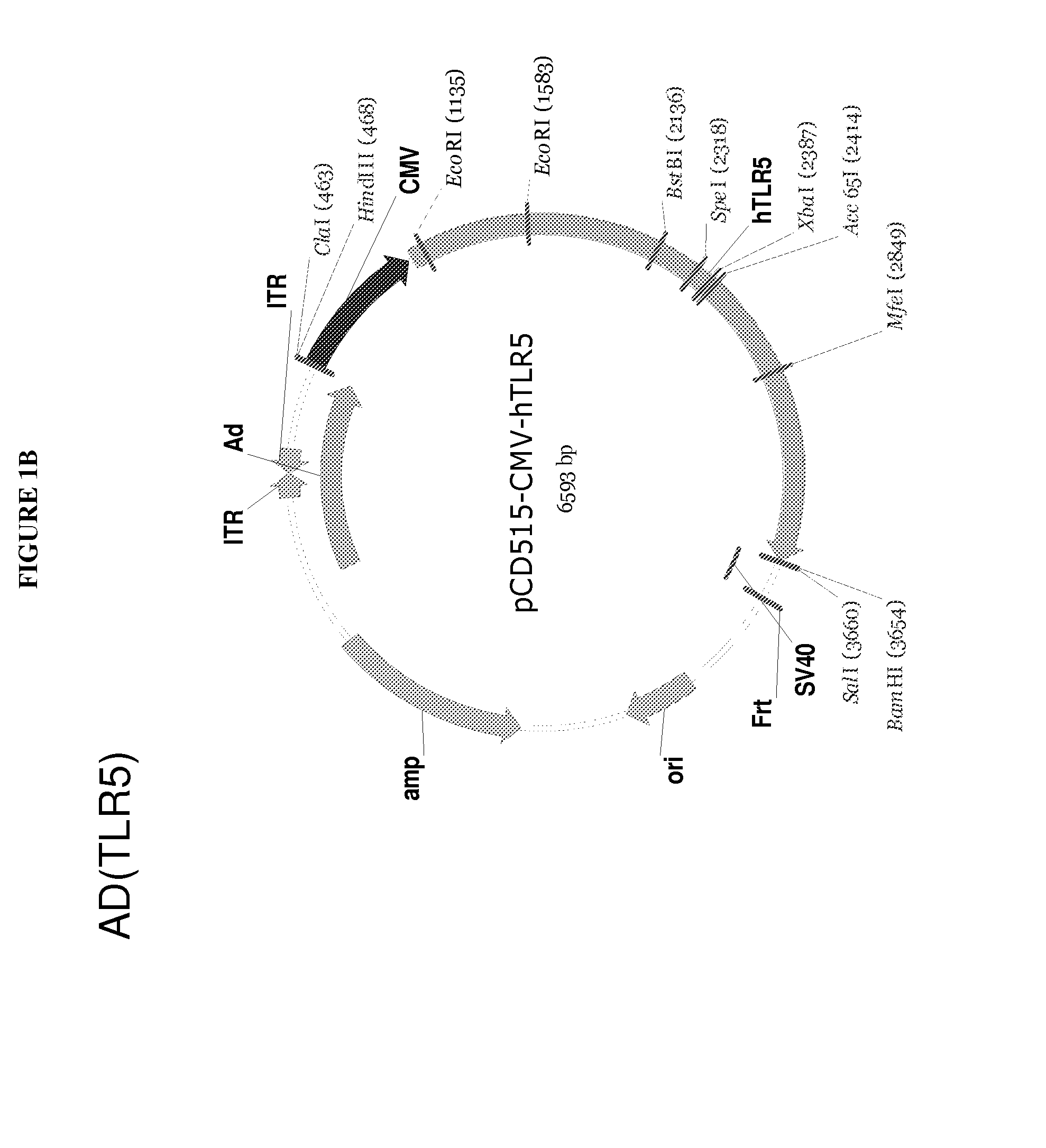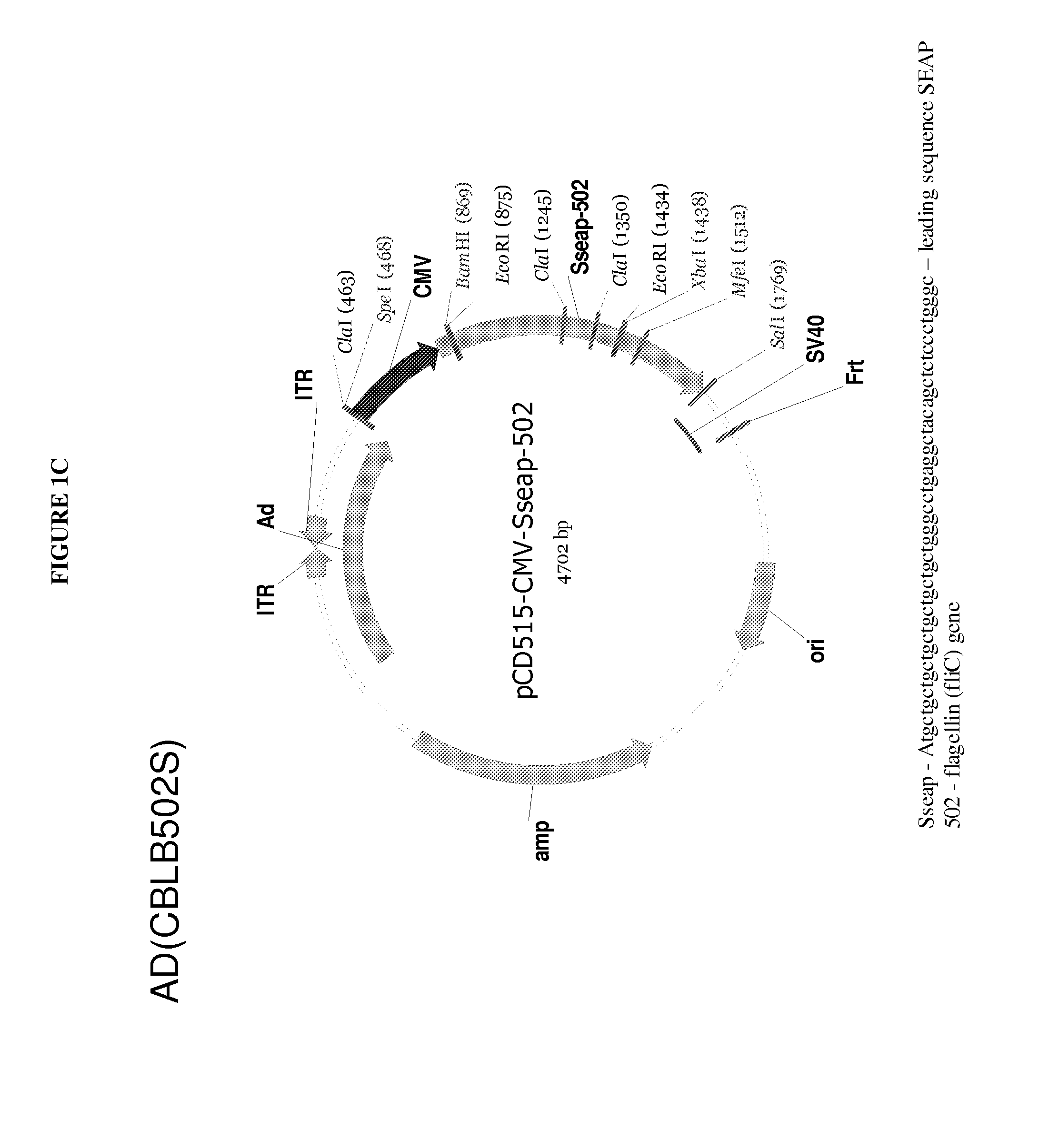Use of toll-like receptor and agonist for treating cancer
a toll-like receptor and cancer technology, applied in the field of cancer and infectious diseases, can solve the problems of limiting the applicability of expressing functional tlr5 and activating trl5 signaling, and reducing this idea
- Summary
- Abstract
- Description
- Claims
- Application Information
AI Technical Summary
Problems solved by technology
Method used
Image
Examples
example 1
Synthesis of Bi-cistronic Expression TLR5 / flagellin Vector and Treatment of Tumor Cells
[0085]Vector constructs were created for expressing Toll-like receptor 5 (TLR-5) and flagellin CBLB502. Vector pCD515 was used as a backbone for these constructs. The cDNA sequence of human TLR-5 and the DNA encoding the toll-like receptor agonist's CBLB502 were individually fused with leader peptide derived from alkaline phosphatase enabling routing of the expressed protein through the endoplasmic reticulum (ER) and Golgi towards extracellular secretion.
[0086]The pCD515-CMV-hTLR5-EF1-502s vector construct expressed the secreted form of CBLB502 flagellin (CBLB502S) and the toll-like receptor 5 (TLR5) at the cell surfcace. This adenoviral vector required modification of the CBLB502 to reach its effective synthesis and secretion by mammalian cells. The adenovirus construct comprises the leader nucleic acid sequence (Atgctgctgctgctgctgctgctgggcctgaggctacagctctccctgggc) derived from alkaline phosphata...
example 2
Synthesis of Bi-cistronic Expression TLR5 / flagellin Vector and Treatment of Tumor Cells
[0089]Two reporter mammalian cell lines, both expressing NF-kB-responsive GFP and differing in their TLR5 status, were transduced with vector constructs pCD515, pCD515-CMV-hTLR5-EF1-502s, pCD515-CMV-hTLR5-502, pCD515-CMV-hTLR5, and pCD515-CMV-Sseap-502 (see Table 3 below).
TABLE 3Activity of adenoviral constructs as TLR5 signaling activatorsReportReporterLine-293-Line-293-TreatmentnullTLRCBLB502−+Ad5 (control) (pCD515)−−Ad5 (TLR5) (pCD515-CMV-hTLR5)−−Ad5(TLR5) + CBLB502++(pCD515-CMV-hTLR5-EF1-502)Ad5 (CBLB502S)−+(pCD515-CMV-Sseap-502)Ad5 (TLR5) (pCD515-CMV-++hTLR5) + Ad5(CBLB502S)(pCD515-CMV-hTLR5-EF1-502s)Ad5 (CBLB502S + TLR5)++(pCD515-CMV-hTLR5-EF1-502s)
[0090]Vector co-expressing TLR5 and TLR5 agonist CBLB502S was sufficient to induce expression of NF-kB reporter in 293-null cells that do not express any of known TLRs and which cannot be activated by TLR5 agonist alone. This experiment demonstrat...
example 3
[0091]To test antitumor effects of bi-cistronic adenovirus having (pCD515-CMV-hTLR5-EF1-502s), 10 ml of the adenoviral suspension (1012-1011 IU / ml) were injected into one of two s.c. growing syngeneic tumors in Balb / c mice originating from CT26 mouse colon carcinoma cells when tumors reached 3-5 mm in diameter and tumor size was monitored until control non-injected tumors reached size limit requiring termination of the experiment. Control mice were injected (again, one tumor out of two per mouse) with adenoviral vector expressing red fluorescent protein (RFP). The results of a representative experiment are shown in FIG. 4. Almost complete lack of growth of tumors injected with (pCD515-CMV-hTLR5-EF1-502s) was accompanied with reduced growth of the uninjected tumor within the same animal as compared with the tumors in control animals injected with RFP-expressing adenovirus. This result indicates (i) powerful in-cis and (ii) visible in-trans effect of pCD515-CMV-hTLR5-EF1-502s indicati...
PUM
| Property | Measurement | Unit |
|---|---|---|
| diameter | aaaaa | aaaaa |
| nucleic acid | aaaaa | aaaaa |
| volume | aaaaa | aaaaa |
Abstract
Description
Claims
Application Information
 Login to View More
Login to View More - R&D
- Intellectual Property
- Life Sciences
- Materials
- Tech Scout
- Unparalleled Data Quality
- Higher Quality Content
- 60% Fewer Hallucinations
Browse by: Latest US Patents, China's latest patents, Technical Efficacy Thesaurus, Application Domain, Technology Topic, Popular Technical Reports.
© 2025 PatSnap. All rights reserved.Legal|Privacy policy|Modern Slavery Act Transparency Statement|Sitemap|About US| Contact US: help@patsnap.com



